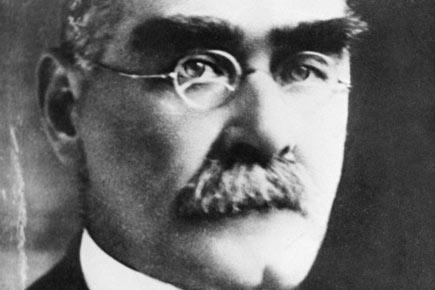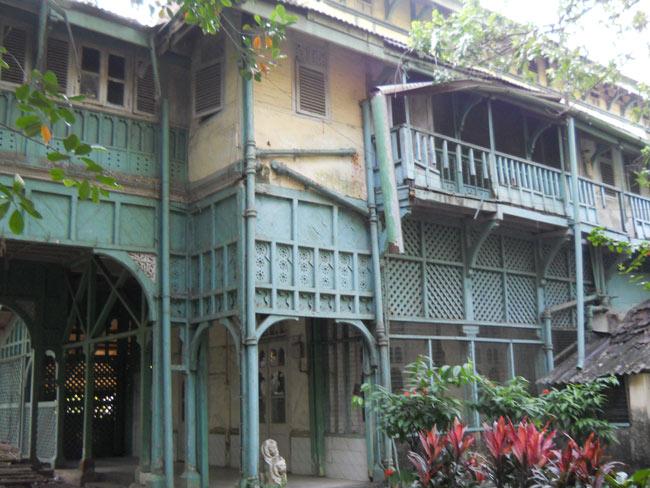On Rudyard Kipling's birth anniversary, here's some interesting information about the author, his connection to Mumbai and 'The Jungle Book', his most famous work

Rudyard Kipling
KIPLING's CONNECTION WITH MUMBAI
ADVERTISEMENT
Rudyard Kipling was born in Bombay on December 30, 1865, in the J. J. School of Arts, of which, his father, Lockwood Kipling, was then head.
His birth home still stands on the campus of the J J School of Art in Mumbai and for many years was used as the Dean's residence.

Rudyard Kipling's bungalow -- a heritage structure that's in bad condition in Sir JJ School of Applied Arts campus. File Pic
INDIAN GREATS ON KIPLING
Jawaharlal Nehru, the first Prime Minister of India, always described Kipling's novel Kim as his favourite book
Indian historian and writer Khushwant Singh wrote in 2001 that he considers Kipling's "If—" "the essence of the message of The Gita in English
Indian writer R. K. Narayan said, "Kipling, the supposed expert writer on India, showed a better understanding of the mind of the animals in the jungle than of the men in an Indian home or the marketplace."
Tennis star Leander Paes had said that Kipling's 'IF' inspires him. "It's from the second verse of IF and it goes like -- 'If you can meet with triumph and disaster and treat those two imposters just the same,' For me, these are lines to live by and thoroughly inspiring Paes had told mid-day in an interview in 2010.
THE JUNGLE BOOK
The Jungle Book (1894) is a collection of stories by English author Rudyard Kipling, first published in magazines in 1893–94.
The original publications contain illustrations, some by Rudyard's father, John Lockwood Kipling
The Second Jungle Book is a sequel to The Jungle Book by Rudyard Kipling. First published in 1895, it features five stories about Mowgli and three unrelated stories.
The best-known of the stories in The Jungle Book revolves around the adventures of an abandoned "man cub" Mowgli who is raised by wolves in the Indian jungle. The most famous of the other stories are probably "Rikki-Tikki-Tavi", the story of a heroic mongoose, and "Toomai of the Elephants", the tale of a young elephant-handler.
The Jungle Book came to be used as a motivational book by the Cub Scouts
In a letter written and signed by Rudyard Kipling in 1895, the author confesses to plagiarism in the Jungle Book.
The verses of The Law of the Jungle lay down rules for the safety of individuals, families and communities.
ABOUT MOWGLI
The name 'Mowgli' means 'The Frog'.
Mowgli's biological mother is believed to be 'Messua'
The original name of Mowgli is believed to be 'Nathoo'.
Mowgli's first job in the village is as a herdman
ABOUT THE FILM
This was the 19th animated feature in Disney animated features canon, and the last to be personally overseen by Walt Disney, himself.
When Gregory Peck was the President of the Academy of Motion Pictures and Science, he tried very hard to get a full-length animated feature film (most notably the The Jungle Book (1967)) not only nominated for Best Picture Academy Award but actually win the award.
Walt Disney told his animation crew to "throw away" Rudyard Kipling's book, "The Jungle Book" because the resulting storyboards were too dark and dramatic.
THE INDIAN TV VERSION
The Indian TV series was a Japanese anime television series called 'Jungle Book Shonen Mowgli' broadcast in 1989. It was dubbed in Hindi and telecast by Doordarshan.
The Indian version had music by Vishal Bharadwaj and lyrics by Gulzar.
Nana Patekar did the voiceover for Sher Khan in the TV version
ABOUT KIPLING's FICTION

An undated picture of Rudyard Kipling. Pic/AFP
Kipling's works of fiction include "The Jungle Book" (1894), "Kim" (1901), and "Just So Stories" (1902), and many short stories, including "The Man Who Would Be King" (1888)
Kipling wrote two science fiction short stories, With "The Night Mail" (1905) and "As Easy As A. B. C" (1912), both set in the 21st century
He received the Nobel Prize for literature in 1907.
 Subscribe today by clicking the link and stay updated with the latest news!" Click here!
Subscribe today by clicking the link and stay updated with the latest news!" Click here!






